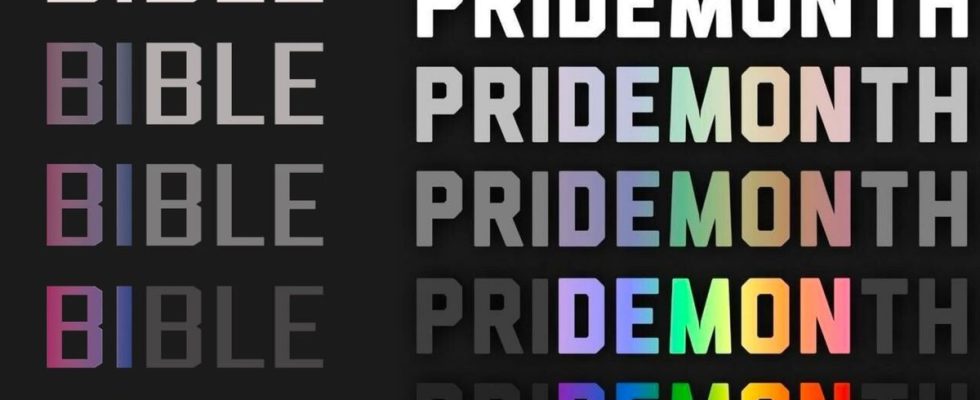From “Pride month” to “demon”, there would be only one space. In any case, this is the message of Lauren Witzke, an American far-right activist. The unhappy Republican candidate for the senatoriales of Delaware in 2020 shared an image using the words “pride month” – the month of LGBT + pride – to highlight the word “demon” in the colors of the rainbow and denounce this which she calls the “LGBTQ Mafia”. “Demonization is really the oldest technique for trying to delegitimize a political or social adversary”, reacts the historian Fabrice d’Almeida.
“The choice of American conservatives is not very skilful because popular culture no longer has the same imagery of the devil as it once did: we are rather in a phase of positivization of the demon who is presented as an outsider who suffers or as a person with superpowers. Seen more than 110 million times, the original tweet has also led to a host of ironic diversions. Some have taken up the idea of lexical Russian dolls with the word “bi” in the word “bible” or the word “sus” (suspect in French) in “Jesus”. Artists have posted demons emblazoned with queer symbols in response. Here and there have flourished numerous twists and turns of the demonization of the LGBT+ community.
From “dirty dyke” to “red dykes”
Turning an insult, a degrading representation, an infamous tendency into a positive symbol is not an uncommon practice for minorities. “The term queer itself was born from demonization, it meant strange, bizarre, outside the norm,” recalls journalist Athina Gendry. Now used as an umbrella word for all sexual and gender minorities, “queer” has been stripped of its stigma over the decades. “The reversals of symbols are very numerous in history”, emphasizes Fabrice d’Almeida. “The cross which was the most infamous condemnation of the Roman Empire has become the symbol of Christians, […] the rooster that was used to denigrate France because it was a domestic fowl that could not fly has become a noble animal, the king of the barnyard and the master of the weather, who says when the sun rises”, illustrates the historian.
Sometimes the symbols are diverted to reclaim a stigma and make it positive. This is the case, for example, of the words “faggot” or “dyke” which are used by many queer people to identify themselves or their loved ones. Thus, in 1970, the radical lesbian movement of the Gouines Rouges was born and in the 1990s, the association for the fight against AIDS Act Up used the word “queer” as its banner. What was once an insult now becomes a rallying cry. After Lauren Witzke’s message, many Internet users also took up her visual to flock it on clothes and thus allow queer people to reclaim what was originally deliberately offensive.
Create a “new “we””
“The insult pretends to be descriptive – for example: ‘you’re a dyke’, when it is not intended to describe but to dominate and distance the other from the ‘normal'”, explains Athina Gendry. So, “take it as a description – “I’m a dyke”, it disarms the insult”, continues the journalist. “Queer identities are constructed through violence but also through the reappropriation of this violence. The use of words designed to belittle a minority, however, is reserved for the latter.
“These are forbidden words that can only be used in a certain context. As with humor, it is possible to make jokes with racist connotations, for example, when you yourself are concerned. On the other hand, if a hetero uses the word “fag”, even under cover of humor, it can be very badly perceived, ”underlines Fabrice d’Almeida. “Those who suffer the insult can reclaim it, not those who do not suffer it”, summarizes Athina Gendry. Especially since the reversal of the stigma also has another goal: to unite. “By reusing these words, you create a new ‘we’ that legitimizes you, you are no longer alone in the face of insult, you are part of a group that can stand up and unite in the face of this violence” , explains the journalist.
The “gay coding” of cartoon villains
Will we soon see demons rub shoulders with rainbows? “So far, the LGBT+ community has not taken up the demon or the devil as an official symbol, but it may come. Very often in history, the battles of words then turn into a battle of images”, slips the historian Fabrice d’Almeida. Especially since the demonization of queer people is already a well-worn antiphon. It is difficult to forget the intervention of an activist against marriage for all in “Le Petit journal” (now “Quotidien”) who affirmed that with the passage of this law “the wrath of God [allait] fall on France”.
“There are a lot of jokes about it, like ‘we end up in hell’, because supposedly straight people will go to heaven and the others to hell”, underlines Athina Gendry who adds that the LGBT+ community has already “a little” reappropriated “the demonic figure”. However, the creator of the podcast Lesbians by the fire yearns for more positive symbols. “In Disney, the villains very often have queer codes, even in recent works. In Luke by Pixar [sorti en 2021], the villain of the film is mannered, he has a “gay coding”, “she illustrates. Before concluding: “We can move towards more positive representations without depoliticizing queer love either. »

